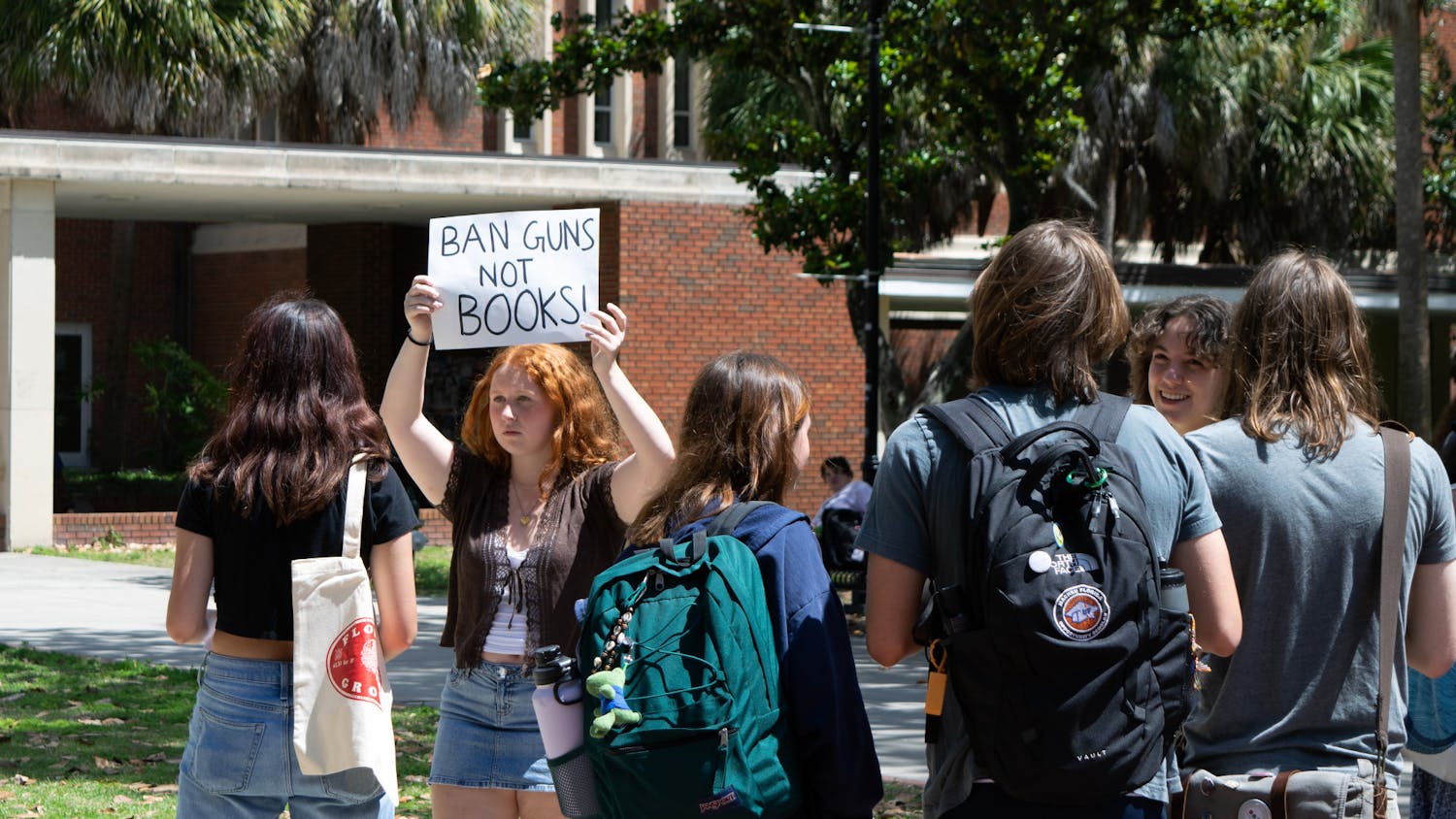Han Yi, who immigrated to the U.S. from China, feels betrayed by the state she’s called home for roughly 10 years due to a bill restricting Chinese citizens from purchasing real estate in Florida.
“This bill legalized discrimination, and it’s absurd,” she said.
Yi, the vice principal of the HuaGen Chinese School in Gainesville, is one among the many frustrated Asian American and Pacific Islander locals speaking out against three bills signed into law by Gov. Ron DeSantis aimed at limiting the Chinese Communist Party’s influence on the state.
The bills, which go into effect July 1, restrict property and land ownership for Chinese citizens in Florida, bar schools and government institutions from accessing Chinese applications and block donations from China to public universities.
The governor announced the bills’ signing at a Stop CCP Influence rally in Brooksville May 8, calling the Chinese Communist Party “the United States’ greatest geopolitical threat.”
“We are following through on our commitment to crack down on communist China,” Gov. DeSantis said.
The legislation does not exclusively target the Chinese government. Instead, the bills highlight a list of perceived countries of concern, which also includes Russia, Iran, Venezuela, North Korea and Cuba.
Members of the Gainesville community protested the bills in April, with some calling the legislation unconstitutional for fear the bills would fuel discrimination against Asian Americans if passed.
Senate Bill 264 prevents “foreign principals” from the specified countries of concern from purchasing agricultural land in the state of Florida. If violated, both the buyer and seller could receive a second-degree misdemeanor charge, according to the bill.
The bill also largely restricts Chinese citizens from buying property in Florida.
Critics of SB 264, like Yi, believe the bill's vague language on who is eligible to purchase real estate will lead to racial discrimination and profiling, which will create challenges for prospective Chinese homebuyers in Florida.
"I don't know what to tell my kids,” she said. “‘That you are born here, yet because you have a Chinese face, you still need to show documents.’”
Yi also worries the legislation will encourage Floridians to be suspicious of the Chinese residents living in their communities, who want nothing more than to raise their families and contribute to the U.S.’s development, she said.
“This bill certainly is sabotaging the American Dream for us,” she said.
Florida Agriculture Commissioner Wilton Simpson said that China’s control of agricultural land around the U.S. is “leaving our food supply and our national security interests at risk” in a news release.
However, Gainesville farmer Txong Moua doesn’t believe there is any truth to Simpson’s concerns. Moua owns Passions Field in Alachua and is a second-generation farmer of Hmong origins — a group indigenous to China but mostly residing in Vietnam.
Though her business wouldn’t be directly impacted by the bill, Moua called it ‘unsettling.’
“Several times I’ve considered not living in Florida because of these things,” Moua said. “But then another part of me wanted to just kind of fight for my rights as a person.”
If more people affected by the bills do not fight back, nothing will change, she added.
Outside of property, Senate Bill 258 codifies the bans that several of Florida’s universities, including UF, placed on TikTok and other Chinese apps in April. It prevents the use of apps from countries of concern on government or educational servers or devices.
The bill affects the online messenger service WeChat, which creates a hardship for people from China, Nuo Qi, a recent graduate of UF from China.
“This app is like iMessage to Chinese,” Qi said. “Without this app, we cannot [message] our friends and family.”
The governor also signed Senate Bill 846, which prevents Florida colleges and universities from accepting donations or entering partnerships with entities based or controlled by any of the countries of concern.
Gov. DeSantis said in an Instagram post the legislation intends to prevent China from influencing Florida’s education system.
Hongcheng Liu is a UF industrial and systems engineering assistant professor who moved to the U.S. from China in 2010.
Liu supports Florida protecting itself from harmful foreign influences, but said he’s concerned about the impacts SB 846 could have on international students and scholars in the state.
“This is going to at least contribute to a climate of unease within our academic institutions,” he said. “Especially the communities in these institutions that have an origin relative to the list of countries in this bill.”
The bill is unclear in its guidelines the Board of Governors and the State Board of Education must follow to approve a donation or agreement with a foreign country of concern. The ambiguity could result in discrepancies in the law's implementation, Liu said.
Liu compared the bill to the China Initiative, a 2018 U.S. Justice Department-led effort to combat economic espionage by attacking academics believed to be Chinese spies.
The program was highly criticized for using abusive tactics and making wrongful accusations, which led to its end in 2022.
“That previous initiative created an atmosphere of mistrust and suspicion around Chinese researchers, scholars, scientists and students,” he said. “That initiative resulted in a concerning level of governmental harassment of innocent citizens or residents.”
Banning donations from potentially relevant, important funding resources could slow research within universities and discourage international talent from wanting to work or study in Florida, he said.
“This bill is going to send a message that the entities from these nations are not welcome,” he said. “That could deter a new generation of potentially very bright international students and scholars from considering Florida universities.”
Contact Jacob Sedesse at jsedesse@alligator.org. Follow him on Twitter @JACOBSEDESSE. Contact Amanda at afriedman@alligator.org. Follow her on Twitter @amandasfriedman.
Amanda Friedman is a senior journalism major and the Enterprise Editor at The Alligator. She previously wrote for the Avenue, Metro and University desks. When she isn't reporting, she loves watching coming-of-age films and listening to Ariana Grande.
Jacob Sedesse is a UF Media Production, Management and Technology senior and general assignment reporter for the metro desk. You may recognize his work from WUFT, where he anchored Morning Edition on WUFT-FM among other programs.





